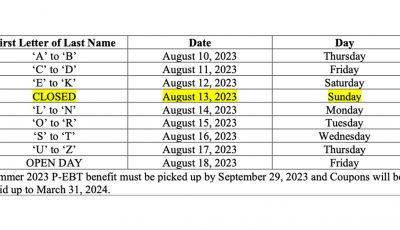Judge: NAP failed to follow own regulations in pursuing claim
Superior Court Associate Judge Joseph N. Camacho has found that the CNMI Nutritional Assistance Program failed to follow its own regulations in pursuing a claim to collect overpaid food stamp benefits in the amount of $1,650 from a former recipient.
In an order issued Tuesday, Camacho ruled that NAP’s claim against Tinian resident Frank Peter Evangelista Santos is both illegal and void.
Camacho said NAP is stopped or prevented from collecting the $1,650 in overpaid food stamp benefits from Santos as it failed to follow its own regulations in pursuing this collection.
The judge also pointed out that the cost of collection proceedings is likely to exceed the amount be sought to be recovered.
He said to determine whether Santos must repay the food stamp benefits he received, the court must look to whether NAP followed its own regulations in collecting the benefits from Santos.
Camacho said NAP failed to follow its own internal regulations when Santos notified NAP of his change in employment.
Camacho said Santos notified the NAP Tinian representative verbally of his change in employment, within 10 days of obtaining employment.
Santos also provided a second notice in writing of a change in his employment.
Camacho said the NAP Saipan Main Office apparently was not timely notified of any change in the Santos’ employment situation by the NAP Tinian Office and thus continued issuing food stamp benefits.
Camacho said NAP failed to follow its own internal regulations when notifying Santos of his disqualification.
The judge noted that Santos was never given an opportunity for a hearing before NAP ceased his food stamp benefits, nor was he given an opportunity for a hearing when NAP began demanding repayment of excess food stamp benefits.
Based on the testimony presented to the court, Camacho said, the NAP Tinian Office and the NAP Saipan Main Office were not aware of what the other office was doing.
Camacho said NAP failed to follow its own internal regulations in pursing collections, which stops the collection.
Based on the testimony provided, the judge said, Santos and his wife together make $50,000 annually.
Camacho said there is nothing on the record to clearly demonstrate that Santos is “financially unable to pay the claim.”
Camacho said another situation where collection must be suspended is where “the cost of further collection is likely to exceed the amount that be recovered.”
Camacho said Santos owes a grand total of $1,650, but the costs of pursing this collection case include the costs of the time of a prosecutor, as well as the time of the other government employee witnesses and the court staff, including the judge, and law clerk at multiple court hearings totals at least $1,104 per day in base salaries alone.
In addition, he said, the costs of pursuing this collection case also includes the airfare, rental car, hotel (if necessary), and daily per diem to travel to Tinian for the prosecutor, court staff and other witnesses.
All of these costs taken together are likely to exceed the recovery of $1,650, Camacho said.
According to court records, in 2015, while unemployed, Santos was the head of a household, which was receiving food stamps under the NAP.
Santos received $550 per month in food stamp benefits while unemployed. He began working on Oct. 19, 2015.
Ten days later, on Oct. 29, 2015, Santos verbally notified NAP’s Tinian representative of his new employment. He provided a formal written notice of his employment on Nov. 13, 2015.
Santos was certified to receive food stamp benefits in September 2015. After being approved, he found employment in the following month.
The maximum income for a family of four to receive food stamp benefits is $933. Santos’ income between November 2015 and January 2016 exceeded this maximum by $603.
In November 2015, Santos continued receiving the same amount of food stamp benefits that he received while he was unemployed.
The total amount of food stamp benefits paid to Santos between November 2015 and January 2016 was $1,650.
During November 2015 to January 2016, Santos’ income made his household ineligible to receive food stamp benefits.
There was a delay between when Santos notified the NAP Tinian Office of his employment change and when the NAP Tinian Office notified the NAP Saipan Main Office of the change.
If the NAP Saipan Main Office had been timely notified of Santos’s ineligibility by the NAP Tinian Office, the NAP Saipan Main Office would have stopped payment of Santos’ food stamp benefits before they were issued.
In February 2016, NAP stopped the food stamp benefits to Santos since his monthly income exceeded the program’s guidelines.
An initial repayment notice, demanding that Santos repay the $1,650 in food stamp benefits he received was then sent the following month to Santos.
The initial repayment notice instructed Santos to contact either one of the two staff in the NAP Saipan Main Office. Neither staff received a request from Santos asking for a fair hearing.
A second and final notice demanding that Santos repay his food stamp benefits was sent to Santos on April 12, 2016.
Santos then responded to the two notices by writing a handwritten note and delivering it to the NAP Tinian Office.
Santos’ handwritten notice asked that he be provided with a fair hearing regarding the two repayment notices.
The NAP Tinian Office forwarded Santos’ note to the NAP Saipan Main Office. He followed up with the NAP Tinian representative, multiple times regarding his request for a fair hearing.
Although there is a NAP office on Tinian, the NAP Saipan Main Office is the only office able to schedule hearings.
Santos never received a fair hearing from NAP.
Santos did not contact the NAP Saipan Main Office directly, nor the individuals listed on the two notices. Instead, he contacted the Tinian NAP representative.
Santos currently earns $25,000 annually. He is married and has two children, as well as other dependents. His wife also earns $25,000 annually, bringing the household total income to $50,000.
On Nov 17, 2017, a full bench trial was held on Tinian.



























